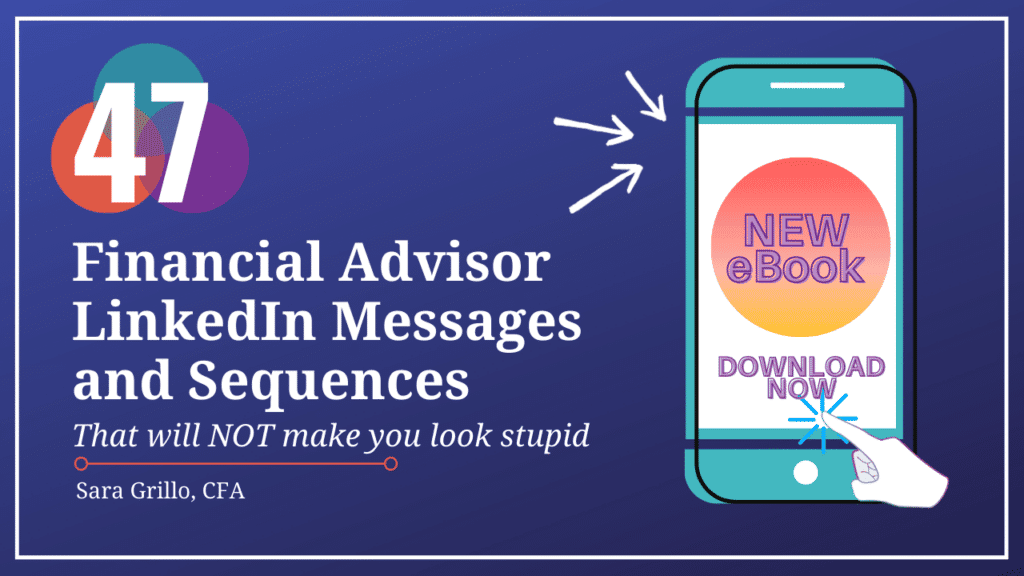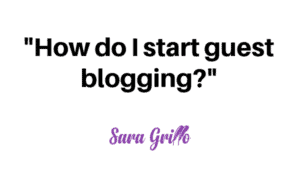Podcast: Play in new window | Download
Let’s be real…the financial advisor risk tolerance questionnaire as we know it doesn’t get the job done. That’s why I’ve got John Morgan of Connected Consultants on the show this episode to discuss the five questions financial advisors should include on the RTQ…but probably aren’t.
By the way, thanks for joining me.
For those of you who are new to my blog/podcast, my name is Sara. I am a CFA® charterholder financial advisor marketing consultant. I have a weekly newsletter in which I talk about financial advisor lead generation topics and it is best described as “fun and irreverent.” So please subscribe!
So if you’re looking for some straight up talk then you’ve come to the right place!

My goal in this podcast is to answer the following questions:
- Why financial advisor risk tolerance questionnaires typically fail
- What to include on your RTQ to increase your ability to understand how your clients truly feel
- How financial advisors can improve their RTQ’s in general
Financial advisor risk tolerance questionnaires stink
When clients come into your office, it’s a lot of pressure. You really have to open up the conversations to include questions that go beyond the normal risk tolerance questionnaire. They don’t know you. Even if they were referred to you, it’s a new relationship. Everyone is coming in with an agenda and it’s a question of how do you dig deeper.
There is a behavioral science to uncovering a client’s emotional attachment to money. Include these five questions to go deeper and get at what the person’s makeup really is psychologically because you at the end of the day you are dealing with a thinking, feeling human being and not a portfolio.
Let’s be real – trying to determine a client’s risk tolerance is a Molotov cocktail. Miscommunication over portfolio risk is one of the biggest reasons financial advisors lose clients.
Some advisors use a risk score. Others don’t.
What else can you do to make sure you get a client’s portfolio risk right?
Level the playing field with a high quality risk tolerance questionnaire that includes thoughtful questions. Here are some you may want to put on your questionnaire (but probably haven’t included yet).
High quality questions for the financial advisor RTQ
#1 What are the three best and worst investment decision you’ve made over your lifetime?
Opening it up with getting them to start talking about those experiences. When were they? How were they? How did they react to those experiences? You want to gather information about how they will operate when things do get difficult, which is almost impossible to do when they are sitting in front of you for the first time. When you talk in generalities, it’s easy for the person to not think too hard about what the question is asking.
#2 Tell me about the biggest risk you have taken in your life and how did that work out?
You want to know, now that they have had time to digest it, what did they learn from it. It will also give you a sense of their emotional ties to money.
#3 Were you invested in the market in 08-09?
That was a dramatic experience for many people and has shaped how they invest going forward. So much can be garnered from asking about how they were invested and how they felt after the progression of the market going down with nothing but bad news every day. How did their advisor communicate with them? Did they like or dislike it? When did they get back in?
#4 Tell me how you felt when you had a major loss in an investment that you made?
Was it a matter of the amount of the loss or the percentage of the loss. Get them talking about that experience and what it did to the emotionally and how they handled it. That is going to be a better predictor of how they are going to handle the next downturn because that is inevitable.
#5 What was the relationship with your last financial advisor like? How did the advisor communicate with the during downturns?
This gets at their relationship with financial advisors in the past. That is going to tell you about how you should react and how you should handle it when this happens. This is one of the best questions financial advisors should include on their risk tolerance questionnaires because it gets at what their past relationship was like with a person in the role that you are going to fill.
The financial advisor risk tolerance questionnaire is only half the battle
At the end of the day, the risk tolerance questionnaire functions as a jumping off point for the relationship. This is a conversation and the end goal is to get the person talking about how they feel deep down inside and what their true attitudes are towards their money. It’s as much about making sure the right questions financial advisors should include on their RTQs are there, but what really matters is the emergence of the information. The RTQ can bring it forth but you as the financial advisor must listen and understand the person and interpret the information – that is of even higher importance.
Sara’s upshot
What’d ya think of my blog about financial advisor risk tolerance questionnaires? Was this helpful?
If yes…
Learn what to say to prospects on social media messenger apps without sounding like a washing machine salesperson. This e-book contains 47 financial advisor LinkedIn messages, sequences, and scripts, and they are all two sentences or less.

You could also consider my financial advisor social media membership which teaches financial advisors how to get new clients and leads from LinkedIn.

Thanks for reading. I hope you’ll at least join my weekly newsletter about financial advisor lead generation.
See you in the next one!
-Sara G
About John Morgan
John Morgan is the Founder & Managing Member of Connected Consultants, LLC in Boca Raton, FL. His company helps solve many of the “Pain Points” felt by both Advisors and Firms. In this capacity, he assists Advisors with affiliation questions and choices, getting in front of more qualified prospects, engaging prospects & clients on their terms using validated behavioral insights, protecting your practice and firm from unnecessary litigation and the reputation loss which comes along with each infraction and more. In a nutshell, Connecting great people with incredible firms and Fintech innovations around the world!





